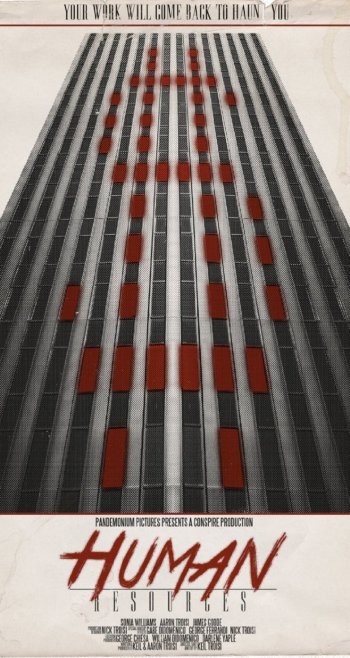HUMAN RESOURCES: DEAD PEOPLE NEED NOT APPLY
by Thomas M. Sipos, managing editor [August 18, 2015]
 [HollywoodInvestigator.com] Although film is a business, film has not been kind in its depiction of business. Wall Street and Office Space from Hollywood, Boiler Room and Clockwatchers from the indie scene. Horror too has attacked the corporate profit motive, most notably John Carpenter's They Live. In that sense, Keil Troisi's film, Human Resources (no connection to Floyd Kemske's corporate vampire novel of the same name), treads familiar ground. [HollywoodInvestigator.com] Although film is a business, film has not been kind in its depiction of business. Wall Street and Office Space from Hollywood, Boiler Room and Clockwatchers from the indie scene. Horror too has attacked the corporate profit motive, most notably John Carpenter's They Live. In that sense, Keil Troisi's film, Human Resources (no connection to Floyd Kemske's corporate vampire novel of the same name), treads familiar ground.
The story concerns Charlene (Sonia Williams), a corporate consulting firm CEO's newly hired secretary. That a new hire would begin by working for the CEO himself is a stretch, but okay. It's a device to provide a protagonist who has both a fresh view of the company and a view of the top.
Charlene discovers that ghosts haunt her workplace. Not many people there can see these ghosts -- the victims of corporate greed.
"Ghost stories are inherently about victims of wrong- doing striving for justice from beyond the grave," said Troisi to the Hollywood Investigator. "I don’t believe in the supernatural, but I think it's an important storytelling form, to sublimate fundamental human fears. It's hard enough to cope with the knowledge that we will die, but far worse is the thought that we might die as a result of someone else's wrongdoing, in pursuit of their own self interest or profit.
"Ghost stories, which are intrinsically revenge stories, seem to serve this important purpose. By dramatizing vengeance against wrongdoers, they are cautionary tales about wrongdoing. Plus, I like the turning point, when you realize the 'monsters,' who seemed so frightening, turn out to be victims, and the real monsters are the humans who created them. That classic story archetype fits nicely within a plot about modern day, white collar crime. I thought modernizing archetypes of traditional ghost stories would work well in an urban, corporate environment. I haven’t seen that before."
The ghosts in Human Resource resemble the sort popularized by The Sixth Sense. People with sallow skin and despairing facial expressions. Prior to that, movie ghosts were often of the ethereal, see-through variety.
Serving as director and DP, Troisi also co-wrote and co-produced the film with his brother Aaron, who stars opposite Williams as her love interest, a worker who's afraid to oppose the corporation. Troisi's work as DP is admirable. Human Resources looks like it was shot on video (a Canon HD SLR), but while not as slick as many big-budgeted films, its visuals are superior to typical micro- budget horror. Lighting is moody, as are the bluish/greenish hues that dominate the color palette. Shots are nicely composed.
"It was important to me that the entire film be shot stable, not handheld," said Troisi, "including the scenes we shot guerilla style. I wanted a locked-down, grounded, intentional tone. Something akin to being stuck or trapped in urban space. Shooting with a tripod in the city did result in getting shut down by police. But you can simply act surprised and apologetic, and go on your way."
Troisi's guerilla shots included filming on Philadelphia's subways. "The cops shut us down. We didn't have a permit. But we would move to another subway station and grab more shots until it was solid."
The IMDb has the film's budget at $19,000, which explains why Troisi declined to pay for permits. He says the $19,000 is only the production budget. Post-production cost extra. "We raised some of it on Kickstarter. It was mostly spent compensating actors, renting cameras, and providing food and resources for cast and crew."

What evils did this company commit to spawn hordes of ghosts? Their most obvious malfeasance is poisoning a town's water supply. Yet a sympathetic lawyer tells Charlene that the company is legally "one step removed" from the misdeeds she brings to his attention, as the company merely provides consulting services to the actual miscreants. (I suppose there are other haunted offices out there?) But we're also told the company owns things, so the poisoning could be one of theirs.
The other corporate misdeeds in Human Resources don't seem so evil to me. Sean (Aaron's role) promotes a plan to provide medical services to Florida seniors. He regards the aging population as a growing market for healthcare (i.e., more profits). He gushes that Florida has high unemployment and right-to-work laws, which means desperate, nonunion labor (i.e., cheap labor).
Is Sean exploiting sick seniors or addressing their healthcare needs? Is he calculating or practical? Selfish or helpful? All of the above, it seems to me. But certainly not evil.
Another of the CEO's "misdeeds" is that his company owns all the rights to his wife's books. She agonizes over this. Why? Didn't she voluntarily sell her rights to his company? Besides which, she can always divorce him and take him to the cleaners.
Human Resources won't win any points for subtlety. Its message is heavy-handed. Its arguments as stacked as those of such pro-capitalist films as Atlas Shrugged and Alongside Night. Polemics are rarely nuanced, and one's level of enjoyment often depends on one's degree of sympathy with the message. Some will enjoy Human Resources because of its message. Some despite the message. Some not at all.
Human Resources was edited on Final Cut Pro. It is just beginning its film festival submissions.
Keil Troisi studied film at New York's School of Visual Arts. He works with the Yes Men as the media director of their nonprofit, and is associate producer of their film, The Yes Men Are Revolting.

|
